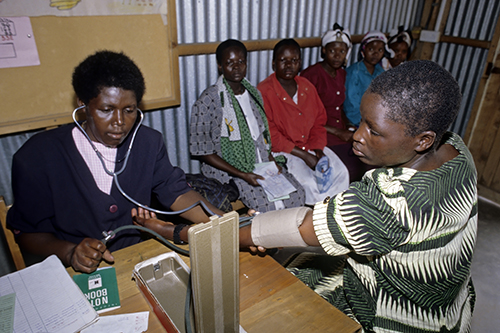Global Health Policy Gets Short Shrift from State Department
Published on Tuesday February 22, 2018
New policy influencing $8.8 billion in U.S. global assistance gets less than 8-page evaluation
On February 7, the U.S. State Department announced that its new policy, Protecting Life in Global Health Assistance, a greatly expanded version of the so-called Mexico City Policy (MCP) or “global gag rule,” had been “widely accepted” by its in-country partners and was therefore unlikely to have any substantial impact on global health programs.
The MCP, which prohibits funding to all non-U.S.-based nongovernmental organizations (NGOs) that provide, counsel on, or refer clients to medical abortions, now applies to nearly the entire global health assistance budget (approximately $8.8 billion) – a 14-fold increase over previous iterations of the policy. Since the use of U.S. funds for abortion services is already prohibited, the policy is aimed at influencing how organizations can spend their own funds while accepting U.S global health assistance.

The State Department review was mandated in President Trump’s executive order reinstating the MCP and proposing expanding it to all Global Health Assistance, and responds to concerns from policymakers and advocates that such a dramatic expansion could have negative impacts. At amfAR, we are deeply concerned about the effect the MCP will have on HIV service delivery, as the policy for the first time encompasses the President’s Emergency Plan for AIDS Relief (PEPFAR).
The State Department review, which gathered stakeholder comments and evaluated government contracts signed or renewed from May to September 2017, concluded that only four of 733 implementing partners lost funding by refusing to sign on to the terms of the MCP. The State Department has so far declined to release the 31 stakeholder comments submitted on the MCP, instead publishing only one quote from the United States Conference of Catholic Bishops.
The review is not just misleading and insufficient, but is fundamentally incapable of measuring any impact on health or HIV services felt by the populations served by U.S. global health programs. Details of the human impact of the MCP have already begun to emerge, including severe cuts to Reproductive Health Uganda, halting their roll-out of a new injectable contraceptives to prevent unwanted adolescent pregnancy, and to Population Services Zimbabwe, who have closed 600 of their 1,200 rural outreach sites in response to cuts. While the number of organizations voluntarily withdrawing from government agreements is an initial indicator of the MCP’s scope, it is not a measure of health impact.
At amfAR, we are deeply concerned about the effect the Mexico City Policy will have on HIV service delivery.A legitimate assessment of health impact must capture the number of countries where non-signing partners were operating, their relative contribution to the provision of health services, the proportion of organizational budgets that were cut, and the resulting reduction or disruptions in health service delivery.
For signing partners, the choice between accepting the terms of the MCP and keeping clinics open, versus continuing comprehensive women’s health services and shuttering clinics, is an extremely difficult one. The decision to agree to the terms, and perhaps change the types of services provided, cannot be conflated with agreement with the MCP. An adequate evaluation must also capture changes in health services and sub-partners among organizations that ultimately signed the terms of the MCP.
A critical failing of the State Department review is that it assessed less than 60% of prime partners and not a single sub-partner. This is because the review was conducted during a relatively brief period (May−September 2017) when 500 prime partners did not have a contract up for renewal, and because the review systematically excluded sub-partners. Since global health programs are delivered through ‘prime’ implementing partners and their sub-partners – who are often in charge of direct service delivery – the non-consideration of sub-partners is a fundamental flaw. In the case of PEPFAR, which receives 65% of U.S. global health assistance, a count of prime partners conceding to the MCP is wholly insufficient.
The current review fails to measure even the most basic outcomes that will matter most when judging the policy’s impact.Indeed, an amfAR assessment of PEPFAR programs identified 944 distinct prime partners between 2005 and 2017, but found more than 7,200 sub-partners between 2005 and 2014 – most of which are smaller local NGOs. Distinguishing U.S-based from non-U.S-based/local implementing partners is key, as U.S-based partners are not required to comply with the MCP since compliance likely violates their constitutional right to free speech. They are, however, required to enforce the restrictions of the MCP with all their non-U.S.-based sub-partners.
By only reporting prime partners who did sign the MCP, and failing to differentiate between U.S-based and non-U.S-based partners, the State Department review drastically overestimates compliance with the policy.
amfAR is calling on the State Department to expand the review of the MCP, not only in terms of timing, but also in scope and depth, in order to meet the minimum standards of rigorous evaluation. Additionally, to ensure transparency of the process, stakeholder comments that are submitted to the State Department as part of the review should be made public.
The next State Department review, scheduled for December 15, 2018, should record critical metrics such as counts of non-complying prime and sub-partners; total funding lost by non-signing organizations, and subsequent cuts to service provision; changes in service delivery among signing partners; and changes in service uptake by health care consumers.
As HIV advocates, we are relying on the State Department’s evaluation for understanding the impact of the MCP on PEPFAR. The current review fails to measure even the most basic outcomes that will matter most when judging the policy’s impact. These shortcomings must be rectified in future reviews.